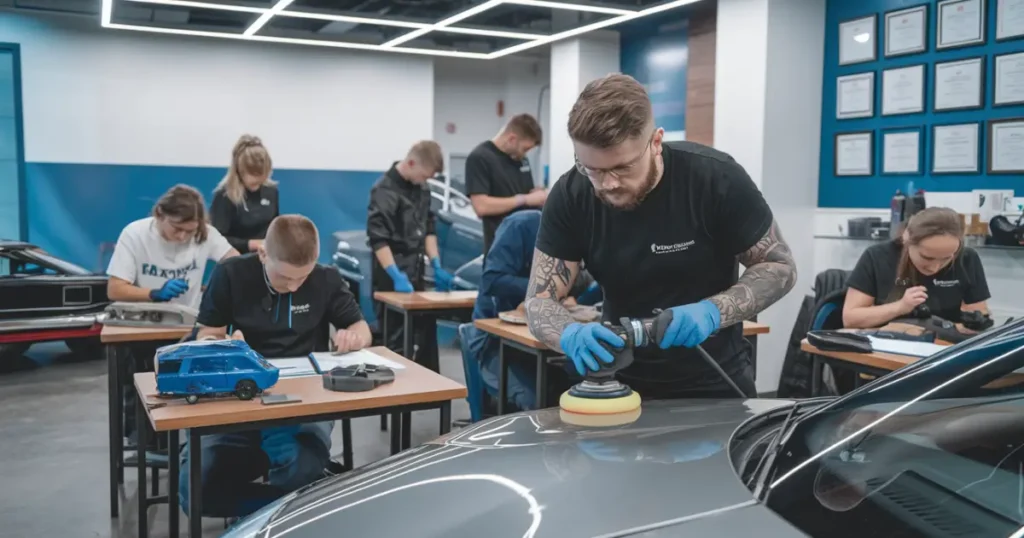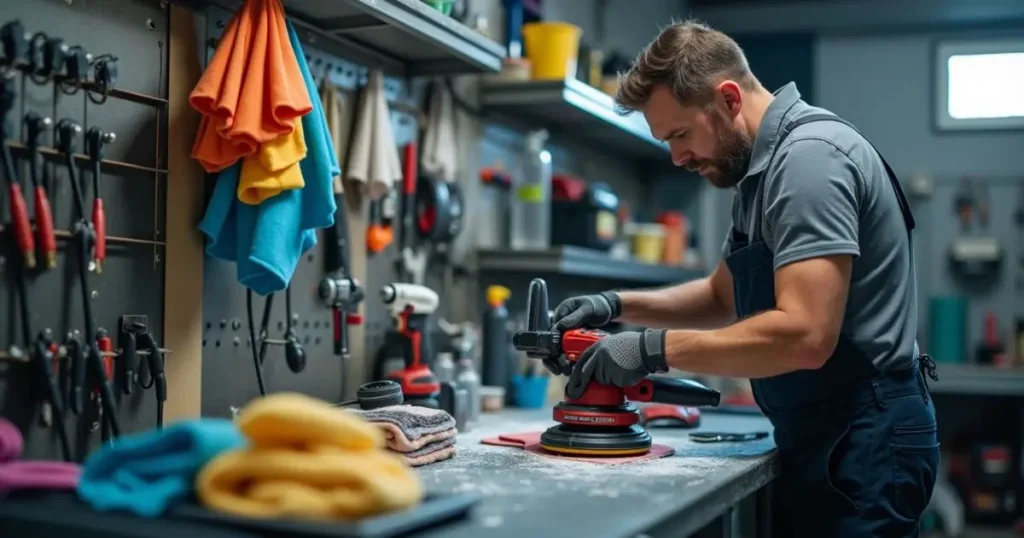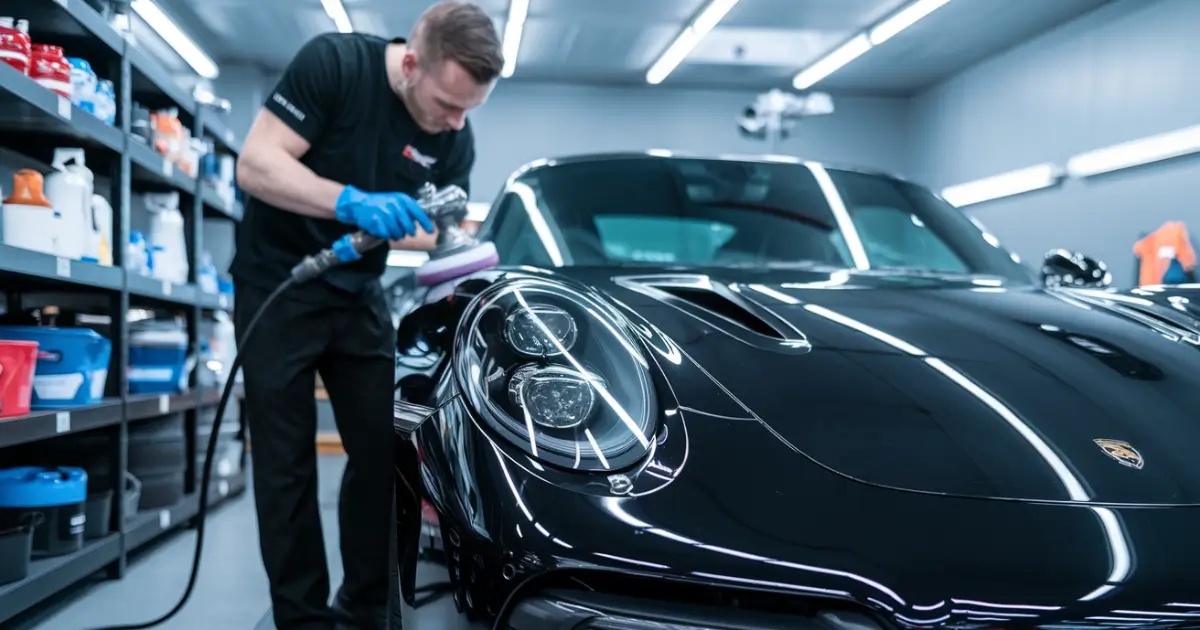It’s no secret that the car detailing industry is booming. With a market value of $14.74 billion in 2024 in the U.S. and an estimated growth of 2.1% from 2025 to 2030, there’s never been a better time to start a car detailing business. People are spending more on maintaining their vehicles’ value and appearance, creating an exciting opportunity for ambitious entrepreneurs like you.
But here’s the kicker: starting a detailing business isn’t just about grabbing a sponge and bucket. It’s about strategy, precision, and understanding what today’s customers expect. Whether you’re dreaming of running a mobile detailing service or opening a full-fledged detailing shop, this guide is here to take you step by step through everything you need to know.
From startup costs to marketing strategies, we’ll cover it all. By the end, you’ll have a clear plan—and the confidence—to launch a profitable car detailing business in 2025. Let’s dive in!
Table of Contents
What Is Car Detailing?
The car detailing business is more than just a thorough cleaning—it’s the art and science of making a vehicle look and feel brand new. Unlike a quick trip through the car wash, detailing dives deep into every nook and cranny, restoring both the interior and exterior to pristine condition. It’s about precision, care, and delivering a result that turns heads.
Exterior detailing involves services like:
- Hand washing and drying: Gentle but effective, leaving no spot untouched.
- Waxing and polishing: Adding shine while protecting the paint.
- Paint correction: Removing scratches and blemishes for a flawless finish.
- Tire and wheel cleaning: Ensuring every inch sparkles, even the smallest details.
Interior detailing doesn’t fall short either. Services include:
- Vacuuming and shampooing carpets: Because a clean cabin feels as good as it looks.
- Cleaning and conditioning leather surfaces: Restoring comfort and elegance.
- Dashboard and console cleaning: Getting rid of dust and grime in hard-to-reach places.
- Odor removal: Leaving behind nothing but that fresh, clean scent.
The benefits of car detailing go beyond aesthetics. It protects a vehicle’s surfaces, extends its lifespan, and can significantly boost its resale value. For car owners, it’s an investment in maintaining both pride and performance. For entrepreneurs? It’s a golden opportunity to meet a growing demand with high-quality services.
12 Steps to Start a Successful Car Detailing Business
1. Get Professional Training (and Maybe Certification)

While you don’t need formal education to start a car detailing business, professional training can elevate your skills and reputation. Here’s how to get started:
- Shadow an experienced detailer:
Spend time observing how a seasoned professional works. You’ll gain hands-on insights into techniques, customer service, and operational efficiency that can’t be learned in a classroom. - Attend workshops or online courses:
Enroll in training programs that cover essential detailing skills, such as paint correction, ceramic coating, and interior restoration. Many courses also teach you how to use advanced tools and products effectively. - Get certified:
Certifications from organizations like the International Detailing Association (IDA) can set you apart from competitors. They signal to customers that you’re trained, credible, and serious about your craft. - Stay updated through continuous learning:
The car detailing industry is always evolving. Attend trade shows, participate in seminars, and read industry publications to keep up with the latest trends, products, and techniques. Staying current ensures your business stays ahead of the curve.
Professional training isn’t just about mastering the technical side of detailing—it’s about building confidence and trust with your clients. When you invest in your skills, your customers will notice the difference.
How to Start a Locksmith Business in 2025: A 10-Step Guide
2. Choose a Detailing Business Model
Your business model sets the foundation for your success. The right choice depends on your resources, goals, and the needs of your target market. Here are three popular Detailing Business models to consider:
- Mobile Detailing:
- What it is: You bring your services directly to the customer, whether they’re at home or work.
- Why it works: Low overhead costs, high convenience for customers, and flexibility in location.
- Considerations: You’ll need a reliable vehicle, portable equipment, and water source or waterless products. Perfect for entrepreneurs who value mobility and adaptability.
- Fixed Location Detailing:
- What it is: Operating out of a dedicated shop or facility.
- Why it works: Allows for larger-scale operations, more specialized equipment, and a professional storefront that builds credibility.
- Considerations: Higher startup costs for rent, utilities, and setup, but greater potential for long-term growth and customer loyalty.
- Specialized Boutique Services:
- What it is: Focusing on luxury vehicles and high-end services like ceramic coating, paint protection film, or restoration.
- Why it works: High-profit margins and the ability to target an affluent clientele.
- Considerations: Requires advanced skills, premium equipment, and an upscale brand image. Ideal for those with expertise and a passion for precision.
When choosing your model, think about:
- Startup costs: How much can you invest initially?
- Target market: Who are your ideal customers, and what services do they value most?
- Flexibility: Do you want a dynamic setup or a more stable, location-based business?
Selecting the right business model will align your operations with your vision, setting you up for sustainable growth.
3. Conduct Market Research
Before diving into the car detailing business, take the time to understand your local market. Research helps you identify opportunities, avoid pitfalls, and build a strategy tailored to your audience. Here’s what to focus on:
- Assess demand for car detailing services:
Look into how many people in your area actively seek car detailing. Is there a growing trend in vehicle maintenance? Are luxury or high-end car owners common? Understanding demand gives you a clearer picture of your market’s potential. - Identify your target demographics:
Who are your ideal customers? Busy professionals? Car enthusiasts? Families with multiple vehicles? Knowing your audience helps you customize your services and marketing strategies to better align with their unique needs and preferences. - Analyze competitors’ strengths and weaknesses:
Study the detailing businesses in your area. What services do they offer? How do they price their packages? Are there opportunities for you to explore, such as offering mobile detailing or providing eco-friendly services? Learning from their successes and missteps can guide your approach. - Understand local pricing trends:
Check how much others charge for various detailing services. This insight helps you set competitive yet profitable prices for your own offerings.
Gather this data using a mix of:
- Surveys: Reach out to potential customers for direct feedback.
- Online research: Browse local reviews, social media, and websites to learn about competitors and customer expectations.
- Industry reports: Use regional or national car detailing trends to inform your decisions.
How to Start Your Profitable Pressure Washing Business in 2025
4. Create a Business Plan
A well-crafted detailing business plan is more than just a formality—it’s your blueprint for success. It clarifies your goals, strategies, and the steps needed to build and grow your car detailing business. Here’s what to include:
- Executive Summary:
Provide an overview of your business concept, including your mission, target market, and key objectives. - Market Analysis:
Research your local market to identify demand, competition, and opportunities. Include insights into your target audience—what are their needs, preferences, and willingness to pay for detailing services? - Business Structure:
Define your legal structure (sole proprietorship, LLC, etc.), business name, and location. If you’re considering a mobile detailing setup, outline how that will operate. - Services Offered:
Detail the specific services you’ll provide, such as exterior detailing, interior cleaning, paint correction, or add-ons like ceramic coatings. - Financial Projections:
Include estimated startup costs, pricing strategies, revenue projections, and ongoing expenses. This section is critical if you plan to seek funding from investors or lenders.
A strong business plan isn’t just a document—it’s a tool for focus and accountability. Use it as a tool to inform your decisions and track your progress. A well-crafted plan can be key to securing the funding you need to turn your vision into reality.
5. Choose a Business Name and Location
Your business name is more than just an identifier; it represents your brand’s identity. A memorable and impactful name can leave a lasting impression and distinguish you in the competitive car detailing industry. Here’s how to approach this step:
- Pick a memorable name:
Select a name that represents your services and conveys professionalism. Ensure it is simple to spell, pronounce, and recall. Avoid overly complicated or generic names that fail to convey what you do. - Secure a matching domain name:
As soon as you’ve settled on a name, check if the domain is available. A matching website URL is crucial for building a cohesive online presence and attracting customers.
If you’re planning to operate from a fixed location, here’s what to consider:
- Accessibility and visibility:
Select a location that is convenient and easily accessible for your customers. High-traffic areas or locations near complementary businesses (like auto repair shops or gas stations) can boost visibility. - Compliance with zoning laws:
Ensure that the location you select is properly zoned for commercial activity and allows car detailing services to operate. Check with your local authorities to avoid legal issues down the road. - Adequate parking and space:
Ensure your site has enough space for vehicles waiting to be detailed and customers stopping by. A clean, organized lot will also leave a positive impression on your clientele.
Your business name and location are the foundation of your brand. Get these details right, and you’ll set the stage for long-term success.
Start Your Lawn Care Business And Turn Grass into Cash
6. Secure Necessary Licenses and Permits
Before you can officially launch your car detailing business, it’s essential to navigate the legal requirements. Securing the proper licenses and permits not only keeps you compliant but also protects your business from unnecessary penalties. Here’s what to focus on:
- Obtain a business license:
This ensures your business is registered and recognized by local authorities. Check with your local government office to understand the specific requirements in your area. - Secure environmental permits:
Car detailing typically involves the use of water and cleaning chemicals, which may require special attention to waste disposal. In certain areas, you may need to obtain environmental permits to ensure that you’re following local regulations, especially if your business operates as a mobile service. - Invest in liability insurance:
Liability insurance provides coverage for unforeseen incidents and gives your clients peace of mind. - Understand zoning regulations:
If you plan to set up a physical location, ensure your chosen site complies with local zoning laws. Certain areas impose restrictions on the locations where automotive services can be conducted.
By checking all the boxes on licenses, permits, and insurance, you can focus on growing your business without legal hurdles.
7. Acquire Funding
Launching a car detailing business requires an initial investment, but there are various funding sources you can consider:
- Small Business Administration (SBA) loans:
SBA loans provide competitive interest rates and offer flexible repayment options. They’re an excellent option if you need substantial funds for equipment, lease space, or staffing. - Personal savings:
If you’ve got savings set aside, this can be a smart way to fund your business without taking on debt. But be sure to budget carefully to avoid financial strain in the early stages. - Crowdfunding:
Platforms such as Kickstarter and GoFundMe enable you to gather financial support from a network of backers. If you have a unique business plan or an angle that resonates, crowdfunding can help you gain initial traction.
To determine how much funding you need, break down your startup costs, which may include:
- Equipment
- Supplies
- Marketing and advertising
- Operational expenses (such as rent, utilities, or insurance)
Accurately calculating your expenses is key to securing the right amount of funding and avoiding financial hurdles later on.
8. Invest in the Good Equipment and Supplies

To deliver exceptional results, investing in high-quality tools and products is a must. Here’s what you’ll need:
- Pressure washers:
These are crucial for eliminating dirt, grime, and other debris from the vehicle’s exterior. A powerful, durable pressure washer will save you time and effort on each job. - Buffers and polishers:
These tools help you achieve that perfect, glossy finish. Whether you’re performing paint correction or applying a protective wax, buffers, and polishers are crucial for a professional touch. - Vacuum cleaners:
A good vacuum is essential for deep cleaning the interior. Look for models with strong suction and attachments for detailed work. - Cleaning solutions and microfiber towels:
Use premium cleaning solutions that are safe for various surfaces—inside and out. Microfiber towels are key for ensuring a scratch-free, streak-free finish.
The right equipment and supplies are an investment in both the quality of your work and the efficiency of your business. Cutting corners here could hurt your reputation and your bottom line.
9. Establish Safety Protocols
Safety should always be a priority in your car detailing business. Protect yourself, your team, and your customers by implementing the right safety measures:
- Follow OSHA guidelines:
Adhere to Occupational Safety and Health Administration (OSHA) standards to ensure a safe work environment, especially when dealing with chemicals or hazardous equipment. - Use personal protective equipment (PPE):
Wear gloves, goggles, and other PPE to minimize the risk of exposure to cleaning chemicals or harmful debris. - Properly store and handle chemicals:
Make sure to store cleaning solutions and chemicals in a safe, secure manner. Follow manufacturer instructions for safe handling and disposal to avoid accidents.
Having strong safety protocols not only reduces risks but also boosts productivity. When your team feels safe, they can work more efficiently and confidently.
10. Set Your Prices
Pricing can make or break your car detailing business. Set rates that balance profitability with customer appeal:
- Factor in your supplies and labor costs:
Calculate the cost of your tools, cleaning products, and labor for each service. This ensures you’re not underpricing and that you’re covering your expenses. - Account for overhead expenses:
Don’t forget to include business overhead—rent, utilities, insurance, and marketing—into your pricing model. - Research competitors:
Check out local competitors to ensure your prices are competitive. Too high, and you might lose customers; too low, and you risk undervaluing your work.
To attract and retain customers, consider:
- Offering package deals (e.g., a complete interior and exterior package at a discount).
- Implementing loyalty discounts for repeat clients.
A well-structured pricing strategy ensures you cover costs, stay competitive, and maximize profitability.
11. Create a Marketing Plan
To stand out in the competitive car detailing industry, effective marketing is key. Start by developing a comprehensive plan:
- Build a professional website optimized for local SEO:
Your website should highlight the services you offer, your pricing structure, and how potential customers can get in touch with you. Optimize it for local search terms (e.g., “car detailing near me”) to increase your visibility in search engines. - Leverage social media platforms:
Use platforms like Instagram and Facebook to showcase before-and-after photos of your work, share customer testimonials, and promote special offers. Engaging with your audience helps build trust and attracts new clients. - Use flyers, business cards, and local advertising:
Spread the word in your community by distributing flyers and business cards in local businesses or posting ads in neighborhood newsletters. - Encourage reviews and referrals:
Word of mouth is powerful in this industry. Ask satisfied customers to leave reviews online and refer friends or family for discounts or perks.
With the right marketing mix, you’ll build brand awareness, attract clients, and keep them coming back for more.
12. Hire and Manage Employees (If Needed)
As your car detailing business grows, you may need help to keep up with demand. Consider these options:
- Hire skilled staff:
Look for individuals who are passionate about cars and have a strong attention to detail. Their skillset will be crucial to delivering high-quality services. - Provide thorough training:
Ensure that your employees are well-trained in all aspects of car detailing, from cleaning techniques to customer service. A skilled team operates more effectively. - Set clear expectations and incentives:
Establish performance metrics, goals, and reward systems to motivate your team and keep them aligned with your business objectives.
Alternatively, if you’re not ready to hire full-time staff, work with independent contractors. This gives you the flexibility to scale your workforce based on demand.
Managing your team effectively will help your business run smoothly and maintain high service standards as you grow.
Conclusion
Starting a car detailing business may seem daunting, but with the right planning, strategy, and dedication, it can lead to great rewards. The demand for quality detailing services is growing, and by following the steps outlined in this guide, you’ll be well-positioned to carve out your niche in this thriving industry.
Take action today—whether it’s seeking professional training, securing funding, or investing in the right equipment. Your future in car detailing is just a few steps away!
For more resources, explore the Small Business Administration, International Detailing Association, and SCORE—all valuable tools to support your entrepreneurial journey.
For more articles featuring success stories and practical business tips, check out our Success section.

